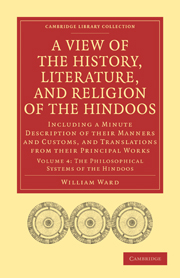 A View of the History, Literature, and Religion of the Hindoos
A View of the History, Literature, and Religion of the Hindoos Book contents
Summary
OF THE HINDOOS.
From a perusal of the preceding pages it will appear evident, that the Hindoo philosophers were unquestionably men of deep erudition, and, having spent many years in the act of rigid austerity, were honoured as persons of so great a sanctity of character, that they attracted universal homage and applause: some of them had more than a thousand disciples or scholars. Shŭnkŭracharyŭ, for instance, after his arrival at Benares, placing himself under the care of Govindacharyŭ, who taught the doctrines of the Védantŭ philosophy, became the most celebrated philosopher of his day: here he took the staff of the dŭndēē, and embraced the life of this class of ascetics, which had then almost sunk into total disrepute. Shŭnkŭrŭ, however, was determined to raise his sect, and, having collected a prodigious number of disciples, he resolved to make the tour of India, to dispute with the learned, and to gain proselytes.—In this pilgrimage he was every where so successful, that he was styled the conqueror of the world. As his terms of dispute were, that if he were unable to obtain the victory he would embrace a secular life, while, if he defeated his antagonist, this antagonist should become a dŭndēē, multitudes were constrained to enter into this order of ascetics.—The effects of this journey and of these labours are visible to this day: it is said, that not less than 4,000 dŭndēēs now reside at Benares.
- Type
- Chapter
- Information
- A View of the History, Literature, and Religion of the HindoosIncluding a Minute Description of their Manners and Customs, and Translations from their Principal Works, pp. 483 - 505Publisher: Cambridge University PressPrint publication year: 2010First published in: 1820


